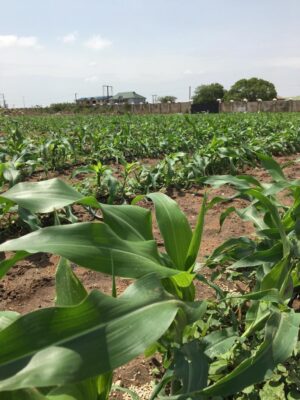Given that agriculture consumes 70 percent of global water resources, it has become imperative for farming communities to change water use in agriculture to help solve the looming global water shortage.
One of the ways to do this, is the adoption of drip irrigation, which is an efficient and economical way to water farmlands. Used commonly in drier areas, drip irrigation is becoming increasingly popular. Unlike other forms of irrigation, such as sprinklers that are only 65-75 percent efficient, drip irrigation is 90 percent efficient in allowing plants to use the water applied.

By reducing run-off and evaporation, drip irrigation applies the water slowly at the plant root zone where it is needed most. The technology has commonly been used in commercial nursery and farm operations, however, homeowners are beginning to take advantage of its uses and benefits. Homeowners can use the drip irrigation technology in vegetable and perennial gardens, and to water trees and shrubs.
Benefits of Drip Irrigation
Drip irrigation involves placing tubing with emitters on the ground alongside the plants. The emitters slowly drip water into the soil at the root zone. Because moisture levels are kept at an optimal range, plant productivity and quality improve. In addition, drip irrigation prevents disease by minimising water contact with the leaves, stems and fruit of plants.
The technology also allows the rows between plants to remain dry, improving access and reducing weed growth as well as saving time, money and water because of its efficient water usage. Drip irrigation also decreases labour, increases effectiveness on uneven ground and reduces leaching of water and nutrients below the root zone.

The N-Drip technology
Based on the affirmation of drip irrigation as being very useful and important in minimising water usage, an Israeli irrigation technology company, N-DRIP, has opened the first Gravity Micro Irrigation demonstration technology in Ghana. The technology is the first and only micro irrigation solution powered by gravity. A disruptive technology that provides precise irrigation, N-Drip produces higher yields while saving water, without adding energy or needing water filtration.
N-Drip is the most efficient alternative to flood irrigation that will vastly influence farming globally.
Indeed, flood irrigation has used the same methodology for the past 5,000 years, and still accounts for 85 percent of irrigated water. However, flooding wastes 70 percent of water, lowers yield, causes land and mineral waste, land depletion and water contamination. This is why farmers, governments and international organisations are actively seeking alternative solutions to flooding.
N-Drip deploys a team of professional scientists and agronomists with years of experience in agricultural research and development at large corporations and successful start-ups. The technology seeks to solve the global water shortage. To do so, we must reduce water use in agriculture by transforming flood irrigation.
Following in-depth research on water and irrigation, N-Drip has developed a groundbreaking system that is the ultimate solution to flood irrigation. N-Drip is leading a global change through the irrigation market, and makes it an efficient and sustainable industry, believing that if 50 percent of farmers transform their flood irrigation to N-Drip’s Gravity Micro Irrigation, the global water shortage crisis will be solved.
Pilot of N-Drip in Ghana
With the aforementioned benefits, the Agricultural Manufacturing Group (AMG), has collaborated with N-DRIP, to pilot the technology in Accra. With its cost-efficient form of irrigating due to its use of gravity in the slow release of water to the roots of the crops, the technology minimises wastage and enabling an all-year-round production of crops.
General Manager of AMG Fertiliser, Henry Otoo Mensah, during the opening of the irrigation site in Accra, said the demonstration project is a technological move toward the addressing the numerous challenges that confront humanity in agriculture production.
“The drip irrigation system is a direct solution to curbing the issue of food security in Ghana, as the system can also be used for fertigation – thus ensuring the efficient utilisation of both water and fertiliser. The technology also saves time and labour,” he said.
As the size of arable lands continue to decline at a high rate, there is the need to maximise crop yield per unit area of land, hence, the decision to collaborate with N-DRIP toward a mutually beneficial and a more socially impactful farming system.
The demonstration system, which will be sited in different locations across the country, is expected to increase the supply of vegetables and other food crops to meet the food demands of the ever-growing Ghanaian population, and deepen the relationship between AMG and N-DRIP.
Representative of N-DRIP in Ghana, Jacques Blinbaun, said the project can be replicated in all locations in Ghana since the initiative wholly runs on borehole water.
He said the N-Drip’s Gravity Micro Irrigation System helps farmers irrigate precisely and efficiently, optimising yields without requiring expensive pumps or filters. “The System provides an easy-to-install economic solution that uses the field’s existing infrastructure and is powered by gravity. As a result, water flows efficiently using sustainable energy while lowering labour costs and money spent on fertilisers”, Mr. Blinbaun said.

The technology uses levelled field and uses flood infrastructure and field topography. It also ensures the use of no pumps, powered by gravity (0.06 bar/0.87 psi), no additional energy as well as the use of no filters.
Israeli Ambassador to Ghana, Shlomit Sufa, said the implementation of the demonstration field forms part of Israel’s resolve to promote and bring Israeli agricultural solutions to Ghana. She said Israel will continue to show interest and support Ghana’s quest to ensure food security through smart agriculture technologies.
Done on a six-acre land at Ashaley-Botwe, an acre of the field accommodated 30,000 maize plants on a higher density – higher than the normal density known to be practised in Ghana by farmers.










